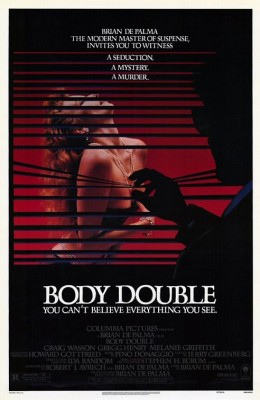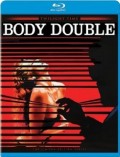| Reviews & Columns |
|
Reviews DVD TV on DVD Blu-ray 4K UHD International DVDs In Theaters Reviews by Studio Video Games Features Collector Series DVDs Easter Egg Database Interviews DVD Talk Radio Feature Articles Columns Anime Talk DVD Savant Horror DVDs The M.O.D. Squad Art House HD Talk Silent DVD
|
DVD Talk Forum |
|
|
| Resources |
|
DVD Price Search Customer Service #'s RCE Info Links |
|
Columns
|
|
|
Body Double
It certainly did on me. Mainstream movies with explicit sexuality and violence, exploring (however clumsily) adult themes all but vanished by the mid-eighties, when all the big studios had given up on chancy ‘70s-style films. Part of the weirdness of seeing Body Double back in 1984 was that despite its punk-, new wave- and MTV-influenced porno world setting, it's nonetheless a seventies-style movie emulating the fifties films of Alfred Hitchcock.
One of De Palma's first successes was Sisters (1973), a superb Hitchcockian thriller-horror film still effective today. It referenced Hitchcock's style without actually stealing from him, much as Stanley Donen did a decade before with Charade, with De Palma going so far as to hire frequent Hitchcock collaborator Bernard Herrmann to write Sisters' genuinely creepy score. But many of De Palma's later films were much less subtle homages. They weren't exactly outright rip-offs as many have charged but De Palma freely stole from the best. In Body Double, for instance, there's a lovemaking scene in which the camera dollies around the two lovers 360-degrees against a process screen, a shot copied almost exactly from Vertigo (1958). Craig Wasson and Deborah Shelton are the young lovers and, boy howdy, Jimmy Stewart and Kim Novak they ain't.
Is Body Double, like the film De Palma made immediately before this, the similarly tasteless Scarface (1983), a good raw material done very badly or bad material done with an audacious stylishness? The answer lies somewhere in the middle. I hadn't seen it in nearly 30 years yet I vividly recalled most of its major set pieces and its uniquely sleazy-hypnotic quality. It's definitely worthwhile.
Twilight Time's Blu-ray offers a very good 1080p transfer (better certainly than the grainy 35mm print I remember seeing in 1984) plus good extras, most ported over from an earlier DVD release.
Wasson plays Jake Scully, an actor starring in a low-budget, punk-style vampire film until, that is, he experiences crippling claustrophobia while lying in a half-buried coffin. The director (Dennis Franz) fires him, and Scully glumly goes back to the grind of auditions and acting classes. He also catches his girlfriend in bed with another man, and Scully, an alcoholic, goes off the wagon.
At auditions and acting lessons he befriends another struggling actor, Sam (Gregg Henry), who offers Scully the chance to housesit another friend's luxurious Hollywood Hills mansion (the famous Chemosphere, in fact). The place is a like a Hugh Hefner fever dream, complete with a telescope focused on a luscious, exhibitionistic neighbor, Gloria Revelle (Shelton). Like Rear Window Scully can't contain his voyeuristic tendencies, and he becomes obsessed with her, especially after her boyfriend, seen only in the shadows, becomes abusive, and when it becomes clear that a fearsome, disfigured "Indian" is stalking her.
Body Double borrows liberally, obviously, and unapologetically from Rear Window and Vertigo, but also from earlier De Palma thrillers. Bizarrely, one outrageous scene breaks the fourth wall in a manner not unlike Jerry Lewis's The Patsy (1964), of all things. This, of course, reflects the movie's slogan, "You can't believe everything you see," and throughout the picture, especially early on, are myriad cheats: skylines that turn out to be painted backdrops, the by then already old-fashioned use of rear-screen projection, film-within-films, a wall of boulders crossing an intersection, and the numerous deceptions committed by the film's villain and his collaborators.
Seen today, the movie is a fascinating time machine looking back at Los Angeles as it existed thirty years ago. It's positively crammed with locations familiar more to locals than tourists: Barney's Beanery, the Tail o' the Pup hot dog stand (in its original location), Tower Records on the Sunset Strip, the then-new Beverly Center, Farmer's Market, etc.
The picture is also memorable in good and odd ways. Melanie Griffith, daughter of Hitchcock veteran ‘Tippi' Hedren (The Birds, Marnie), practically steals the film as porno star Holly Body. Closely resembling her mother at that time, Griffith's character and her dialogue overflow with sexually explicit frankness and profanity, so casually expressed it embarrasses Scully and even the audience. Yet, she also projects exactly the kind of virginal innocence that makes her porno star stardom quite believable. She acts rings around Shelton, who's attractive by that period's standards yet wooden in her scenes with Wasson.
Wasson, a decent actor who ended up in unflattering parts and/or flops that stalled any hopes of a leading man movie career, is perfectly cast here as the unconfident struggling actor, neither really handsome or talented enough for the big leagues, but by God the perfect patsy in an elaborate murder plot.
The porno world Scully tries to infiltrate late in the movie is bizarre. Unconvincingly he's hired for an elaborately staged sex scene-music video (strangely mixing straight S&M and gay sex iconography; Who's this movie for, exactly?) that's like a porno world equivalent of "Goin' to Heaven on a Mule," a musical extravaganza complete with new wave British band Frankie Goes to Hollywood performing their big hit, "Relax."
Scuzzy as it is, many forget that Body Double has a lower body count than your average TV cop show. There's just one murder in the entire film, but De Palma undeniably makes it unforgettable. As gory and outrageous as the rest of the picture, the audience I saw the film with back in 1984 alternately screamed, laughed at its over-the-top gore, and I remember at least two people in the audience madly scrambling for the exit in disgust. Which pretty much sums up the movie itself.
Video & Audio
Body Double looks real good on Blu-ray, the 1.85:1 release presented in a clean 1080p transfer with good detail, color, and contrast. The DTS-HD Master Audio 5.1 mix also impresses and even provides a jolt or two for the audience. The film is in English only with optional English subtitles. The disc is region A encoded and limited to 3,000 units all, alas, sold out.
Extra Features
Supplements include an older, multi-part making-of documentary featuring De Palma, Griffith, Henry, and Shelton but not, alas Craig Wasson, who I would have most liked to have seen interviewed. Also included is Pino Donaggio's Herrmann-esque score on an isolated track, and Julie Kirgo's amused and informed liner notes.
Parting Thoughts
Not exactly good but undeniably unforgettable and even worth revisiting every few years, Body Double is, amazingly enough, Highly Recommended.
Stuart Galbraith IV is a Kyoto-based film historian whose work includes film history books, DVD and Blu-ray audio commentaries and special features. Visit Stuart's Cine Blogarama here.
|
| Popular Reviews |
| Sponsored Links |
|
|
| Sponsored Links |
|
|
| Release List | Reviews | Shop | Newsletter | Forum | DVD Giveaways | Blu-Ray | Advertise |
|
Copyright 2024 DVDTalk.com All Rights Reserved. Legal Info, Privacy Policy, Terms of Use,
Manage Preferences,
Your Privacy Choices | |||||||














